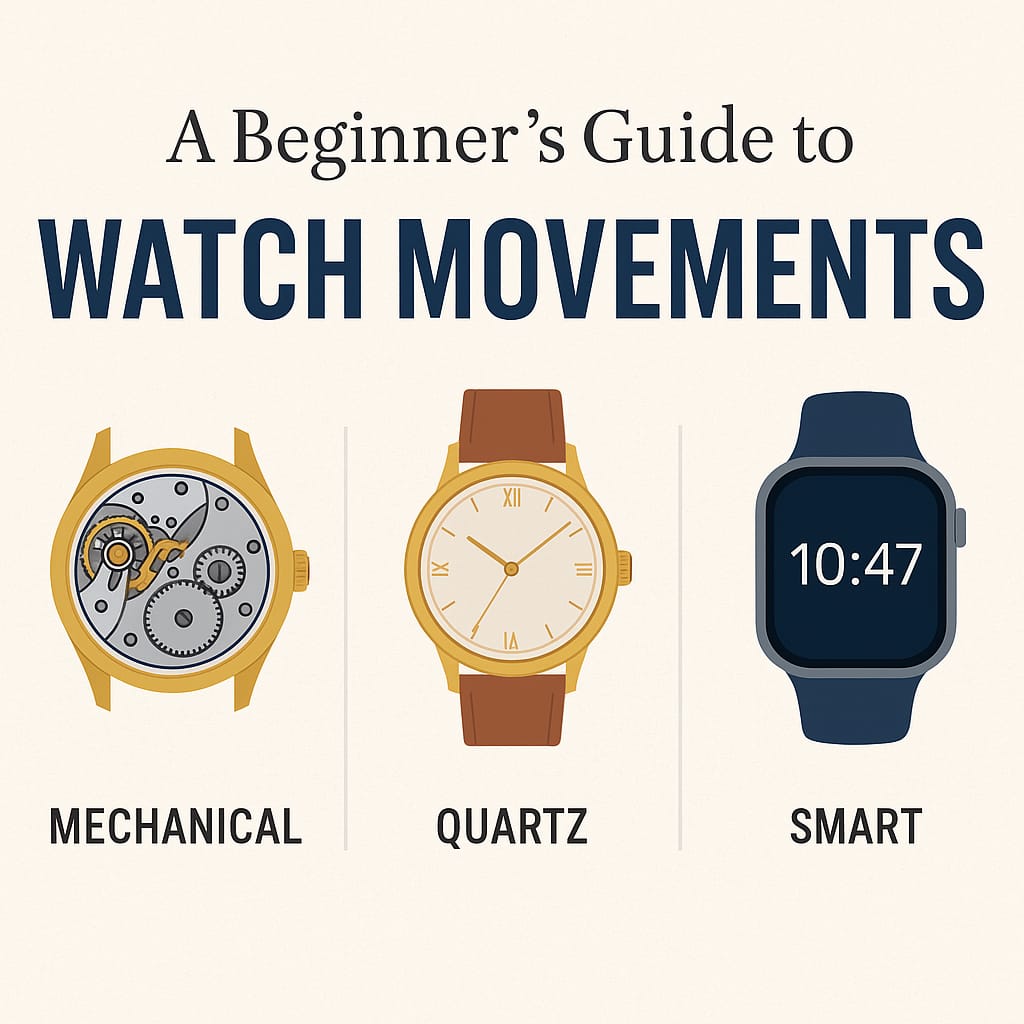A Beginner’s Guide to Watch Movements (Mechanical, Quartz & Smart)
When diving into the world of watches, one of the most essential things to understand is the movement — the mechanism that powers the watch and keeps time. Whether you’re a casual buyer or starting a collection, knowing the differences between mechanical, quartz, and smart movements can help you make informed and stylish choices.
In this beginner-friendly guide, we’ll explain what each type of movement is, how it works, and the pros and cons to consider before you buy.
⌚ What Is a Watch Movement?
A watch movement, also known as a caliber, is the internal engine that drives the watch hands, date display, and other functions. There are three primary types:
- Mechanical (manual and automatic)
- Quartz (battery-powered)
- Smart (digital/tech-enhanced)
⚖️ Mechanical Movements
🔁 Manual Movement
Manual mechanical watches require you to wind the crown regularly to keep the watch running. They are powered by a mainspring that stores energy and releases it slowly.
🧰 Automatic Movement
Also known as self-winding, automatic watches use a rotor that winds the mainspring as you move your wrist. This means no battery and minimal winding if worn daily.
Pros:
- Timeless craftsmanship and aesthetic
- No battery required
- Often appreciated by collectors
Cons:
- Can be less accurate
- Requires regular winding or wearing
- Usually more expensive and heavier
⚡ Quartz Movements
Quartz watches are powered by a battery that sends electrical signals through a quartz crystal, creating consistent vibrations that regulate timekeeping.
Pros:
- Extremely accurate
- Low maintenance
- Affordable and lightweight
Cons:
- Requires battery replacement every 1-2 years
- Less prestige in watch enthusiast communities
- No sweeping second hand (ticks instead)
🤖 Smart Movements
Smartwatches combine digital technology with timekeeping. They often include health tracking, GPS, notifications, and other smart features.
Pros:
- Multifunctional: calls, texts, health, navigation
- Syncs with smartphones and apps
- Ideal for fitness and productivity
Cons:
- Battery life varies (may require daily charging)
- Limited lifespan compared to mechanical watches
- May lack classic style appeal
🔧 How to Choose the Right Watch Movement
When choosing a watch, ask yourself the following:
- Do you value tradition and craftsmanship?
- Go for a mechanical or automatic watch.
- Do you prefer convenience and accuracy?
- Quartz is your best bet.
- Are you tech-savvy and always connected?
- Consider a smartwatch.
- What’s your budget?
- Quartz offers affordability.
- Mechanical watches are often premium.
- Smartwatches vary in price based on features.
✨ Final Thoughts
Each movement type serves a different lifestyle and purpose:
- Mechanical: For the purist and collector
- Quartz: For simplicity and daily use
- Smart: For the tech-forward and multitasker
Understanding the movement is the first step in becoming a confident watch enthusiast. Whether you’re investing in your first piece or adding to your collection, let the movement reflect your lifestyle, personality, and needs.
This guide is brought to you by Kairo — where time and technology meet style.





Leave a reply